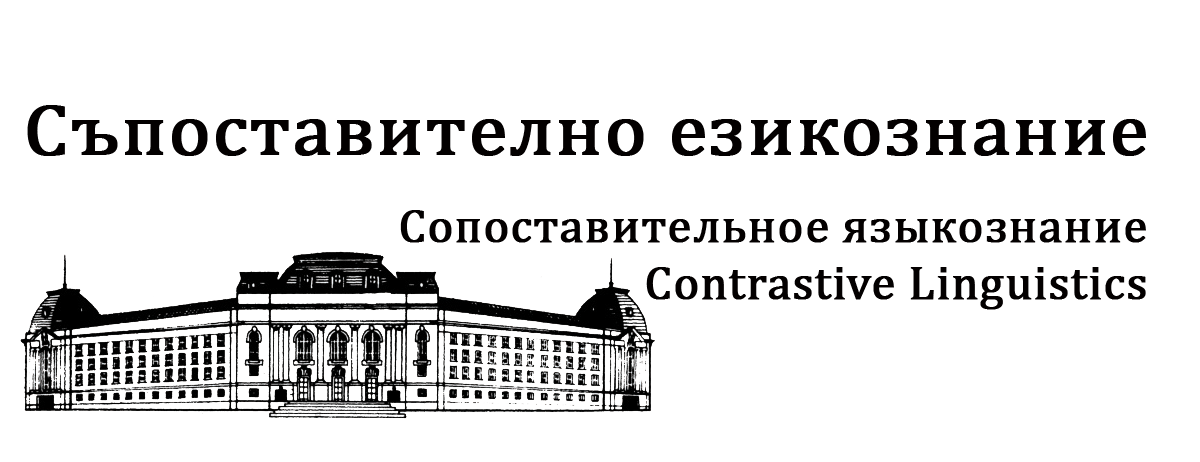Съдържанието можете да изтеглите оттук.
Съдържание
Съпоставителни изследвания
Борис Наймушин – Залог и преходност (върху материали от българския, руския и английския език) // 5
На материале болгарского, русского и английского языков рассматривается дискуссионный вопрос о взаимоотношениях залога и переходности/непереходности глагола. Высказывается мнение, что традиционный подход, ставящий возможность образования пассивных форм в прямую зависимость от переходности глагола, явно противоречит реальным языковым фактам, и делается предложение заменить традиционное бинарное противопоставление переходных/непереходных глаголов шкалой переходности.
The article deals with the controversial issue of relations between voice and transitivity. It is claimed that the traditional approach which maintains the existence of direct and obligatory connection between transitivity and passivizability contradicts the language reality. Proposition is made to replace the traditional binary opposition of transitive/intransitive verbs with a scale of transitivity.
Росица Стефчева – Словообразувателно-семантична характеристика на транслокативните префиксални формации с пре- и про- в български и сърбохърватски език // 14
Объект исследования – транслокативные префиксальные формации с префиксами пре- и про- в болгарском и сербско-хорватском языках. Предлагается новый словообразовательно-семантический способ классификации префиксальных деривативов с целью построения словообразовательных категорий и субкатегорий на основе протекания трансгрессивного способа действия. Семантический анализ словарной статьи сочетает элементы теории значения как Иерархической и предикативно-аргументной структуры, и на этой основе обособляются І-ая и II-ая субкатегории. В исследовании в сопоставительном плане описываются виды МО в сербско-хорватском и болгарском языках, сделаны общие выводы об этимологической и функциональной близости префиксов пре- и про- в двух языках.
The article considers the translocative formations with the prefixes pre- and pro- in Bulgarian and Serbo-Croatian. A new classification of the derivatives considered is suggested – based on formal and semantic criteria, categories and sub-categories within the transgressive aktionsart and preceded by word-formation and semantic analysis combining elements of the theory of meaning as a hierarchic and predicate-argument structure. Contrastive observations on the kinds of motivating bases and on the etymological and functional proximity of pre- and pro- in both languages are made.
Силвия Миланова (Перник) – Езикови модели за постигане на атрактивност в чешката и българската „жълта” преса // 22
The author points out that, in spite of its bad reputation, the „yellow press“ deserves the attention of linguists and offers her own observation on the linguistic means aimed at achieving attractiveness in its texts. The analysis is based on material from the tabloids published in the Czech Republic and in Bulgaria.
Дискусии, обзори и научни съобщения
Christo Moskovski (University of Newcastle, Australia) – On Reflexive and Pronominal Binding in Bulgarian // 33
The paper considers reflexive and pronominal binding in Bulgarian within a Government/binding framework. Special attention is given to issues of locality and complementarity in the distribution of Bulgarian reflexives and pronominals, with specific reference to constructions which have long presented problems for the Binding Theory. Based on the analysis of a range of Bulgarian data the paper demonstrates that existing formulations of locality constraints (e. g. in terms of ‘governing category’ or ‘complete functional complex’) are descriptively inadequate to account for the distribution of reflexives and pronominals in that language. The study develops a qualitatively new model of reflexive and pronominal binding incorporating LF movement of reflexives and an entirely new locality constraint involving the physical distance between binder and bindee (measured in terms of X-bar structure).
Мони Алмалеx – Сакралното четирицветие в Петокнижието. Езикова картина на света и национален манталитет // 64
The study examines the terms for red, blue, scarlet and white (linen) in the four colour unite in the Pentateuch (on contrastive material – Hebrew – Indo-European languages). The four colour unite is in the Tabernacle. The author goes through the cognitive similarities and differences in the semantic features and etymology of the Colour Terms in Hebrew and Bulgarian. He offers semantizations of the basic colour terms – depending on lexical semantic features of the Hebrew root and on context.
Christo Stamenov – Две (?) английски заемки в българския език // 112
The paper deals with the Bulgarian forms дънки and джинси. The origin of the second word is obvious and a hypothesis about the first one is put forward. The adaptation – phonetic, morphological and semantic of the second word – is also discussed with a special reference to the way the two words fit into their semantic field in Bulgarian.
Христина Дейкова – Към въпроса за гръцките заемки в българския език – произход на няколко диалектни думи // 118
The dialect verbs under analysis, coined within Bulgarian on the base of nouns borrowed from Greek, (which are unattested) have undergone specific semantic development. They have been specialized as folk agricultural terms or have joined the everyday colloquial layer of the vocabulary with a transferred meaning. They enrich the lexicon of Bulgarian and create specific homonymic relations with words of native origin.
